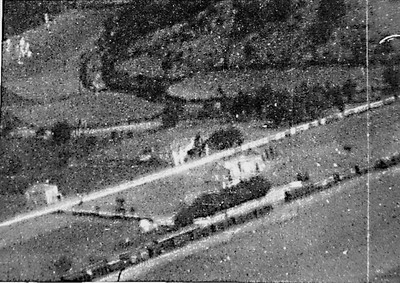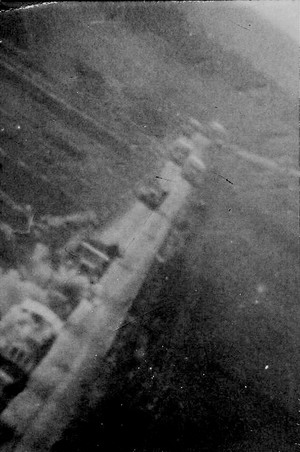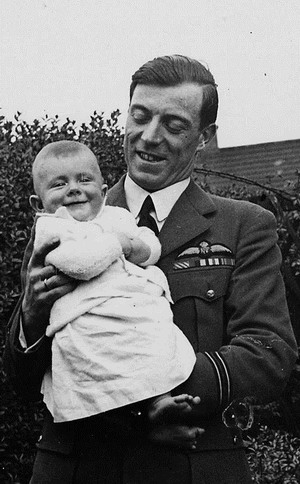
Strafing a train near Hum, Yugoslavia,
May 6th 1944, by F/L Pawsey with 253 Sqdn
As a very short preface to this short account of my life I recall the advice given to me when I was a youngster, "Bor", he said, "What you need to be good at gardening, or anything else is a good eye, sharp tools and common sense, I know you have a gift on two of 'em but I ain't sure about the other". That advice has been a valuable asset in the many and various walks of life that have come my way -pupil - (many times) also engineering, a pilot, working on a fruit farm, school master and head master, a magistrate, parish councillor, etc etc..
Born in 1919, I was very fortunate to be one of five children ( the eldest) who, were blessed with having wonderful parents who combined loving care with discipline at time when poverty dominated life in rural Suffolk. As soon as one started school-in my case at the age of 4 ½ years, life was a series of chores-fetching milk, chopping kindling and a host of errands.
I started school at Alpheton National school where the word "National" proclaimed it's origin to the Church of England. There were approximately sixty pupils in two rooms-one for 4-9 age range and the other for the 10--14 years, I should interpolate here that the village had no gas, electricity, water supply, sewage system or telephone. The syllabus of the school was based on the three Rs leavened by a small amount of History, Geography, Nature Study and singing. Any free time was spent bird's nesting, tree climbing etc, etc,.
At the age of ten I passed the scholarship exam to attend Sudbury Grammar school where discipline and hard work prevailed. Having gained my Cambridge School Certificate the R.A.F. was suggested by the Headmaster as a career. I took the entrance exam and with six hundred other boys from every part of the British Isles I went to No 1 School of Technical Training at Halton which was the finest school with a comprehensive social intake that I have known.
I graduated from here at 19 years of age and was posted to No 56 Sqdn. at North Weald in January 1939. The squadron who were newly equipped with Hurricanes was preparing for the expected war with Germany. I remained with the squadron until May 1940 when I joined 238 squadron and later I joined 109 squadron. These took me to airfields at Tangmere, Middle Wallop, Chilbottom, St Ivel and Boscombe Down.
By now I was a sergeant and in the spring of 1941 I was posted to the Initial Training Wing for pilots who came from all walks of civil life.
It was our good fortune that the group were sent to the U.S.A. to train as pilots under a scheme known as the Arnold Scheme-promoted by an American General although America was then still a neutral country.
We followed an identical course of training to the American cadets at Primary, Basic and Advanced flying schools.
The course was strictly controlled and I graduated as an above average pilot. Before returning to England I was commissioned in Canada and returned to the U.S.A to do six months as an instructor at the Advanced Flying School at Napier Field, Alabama.

I returned to England at the end of 1942 to take a course to adapt to the British system and then a course at an Operational Training Unit in Scotland. From there I was posted to North Africa where I joined 253 Hyderabad State Squadron in Tunisia who were then flying Hurricanes. The squadron was at that time involved in the protection of ports and convoys.
Eventually the squadron changed to Spitfires and moved to Capodichino at Naples.
From there we moved to Corsica-recently captured-to assist an American Spitfire Wing in more aggressive operations such as escorting bombers when raiding Arezzo or Rome marshalling yards, strafing ships, motor transport and other targets in Italy.
At this time the Spitfires were equipped to carry 250lb bombs under each wing and dive bombing was added to our operations.
From Corsica we moved back to Foggia airfield in Italy and became part of the Balkan Air Force to support the Partisans in Yugoslavia, Greece and Albania and to attack the German forces there.

These were hectic times and there was air combat but we were almost entirely engaged in ground attacks on railways, bridges, motor transport and even leaflet dropping !.
The German flack was becoming extremely accurate and we lost a number of aircraft but with my "sharp tool" (the Spitfire), my good eye and common sense and luck I survived.
During this time I went on a special mission to the Partisans to improve co-operation between them and the air support we were providing.
I was briefly C.O. of the squadron but my operational time was over and I returned to England via Egypt where I found I had been awarded the D.F.C..
Having damaged a leg and my ears from descending from altitude, I retrained to work with the Supply and Transport columns and I was duly posted in 1945 to join 313-S X T column in Belgium.
The duties were the transport of supplies in Europe to such places as Hamburg, Hanover and Holland.
Eventually I was "demobbed" in September 1946.
During these years I had married Gladys and we had an infant son, Christopher, and had to make a decision on our future and what to do in civil life after nearly twelve years in the R.A.F.

My father was a fruit and vegetable grower and in the company of many ladies and some German prisoners I worked with him for a year.
After advice from many sources I decided to train as a teacher and took a course with other returned servicemen.
At this time Gladys, Christopher and I inhabited a small thatched cottage in Alpheton---a time of shortages and Alpheton had no gas, electricity, water supply or sewage system and my heroine was Gladys, who, coming from London was used to all of these but adapted to the more primitive life in what I would today call a hovel. The teacher course meant another spell of separation for us.
After graduation as a teacher I joined the staff of Hedingham Secondary School in Essex, becoming it's Headmaster for three years and then Deputy Head when the school became a Comprehensive with eleven hundred pupils.
The new young head, Mr Cobb and I shared the growth and adoption of new ideas with an excellent team.
During these years my daughter Janet was born, we moved to a new home in Sible Hedingham. I was appointed as a magistrate in Essex and became chairman of the Halstead and Hedingham Bench.
Some thirty years ago, my wife and heroine Gladys, developed cancer and when I retired we moved to Cavendish and enjoyed some years of activity in that village and during this spell I gave hundreds of talks on dialect in Suffolk, Essex and Norfolk..
Gladys became ill again and I was her carer for several years until she died after sixty years of married life together, during which we were able to enjoy the youth of three lovely grandchildren.